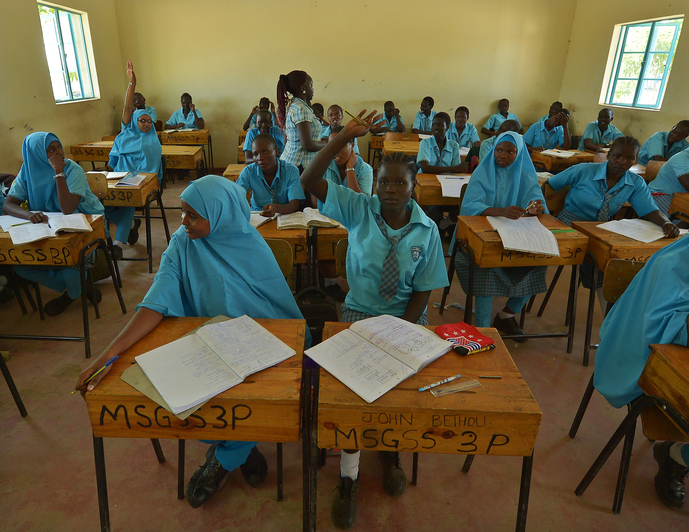In the education sector and within the camps, UNHCR and partners provide both formal and non-formal basic and secondary education to refugees. In Dadaab, there are 73,394 learners enrolled in ECD, primary and secondary schools. This includes 1,761 students accessing primary and secondary education through the accelerated education programme (AEP). Integration of ICT into learning has been made possible through Vodafone Foundation’s Instant Network Schools (INS) programme. 13 solar powered learning centers have been set up in Dadaab where children and teachers can access local digital educational content as well as the internet over Safaricom mobile network.
Education partners have employed innovative approaches to the delivery of tertiary education through improving access without compromising on quality. Post-secondary education is provided through vocational skills in Kakuma (1 centre) and Dadaab (4 centres) to about 2000 youth. E-learning is offered in Kakuma through Jesuits Commons Higher Education at the Margins (JC:HEM) and Strathmore University. In Kakuma, Masinde Muliro University of Science and Technology has been conducting diploma teacher training sessions to build the pedagogical competencies of the refugee teachers who form the bulk of the teaching workforce.
Through partnership with Strathmore University, refugee students in Kakuma will access tertiary education, specifically in the area of business and professional courses such as the Certified Public Accounting (CPA) training for which the institution is internationally acclaimed. The Strathmore University Education project shall commence by initially supporting 30 students from Kakuma refugee camp in certified public accounting.
In Dadaab, a number of scholarships are given to refugee youth to access tertiary education in different tertiary institutions across the country. The scholarships include DAFI, DD-Puri, BPRM and DANIDA. Scholarships support study areas of teacher training, medicine, engineering, social sciences, technology and other management courses. Close to 1,200 students are benefitting from these scholarships. DAFI is currently sponsoring 208 refugee students in 5 public universities and several mid-level colleges.
In Dadaab, Borderless Higher Education for Refugees (BHER) delivers university level education in situ, through a mixture of both online and face-to-face interaction between the students and academic institutions drawn from Kenya and Canada. Windle Trust Kenya has been part of this initiative since inception and the lessons learnt in the last couple of years have revealed that, through the embracing of technology and delivery of university level education within the camps, more students are able to benefit because of reduced costs attributable to reduction in student allowance costs and tuition fees. Various institutions are also able to come together to pool their diverse areas of expertise and courses for the benefit of the students. BHER has provided blended E-learning to over 600 learners since inception in 2013.
The Education Unit forges good working relations with Ministry of Education, Science and Technology, County Education Department and education partners through consultative fora and educational management engagements. Education for refugee children and young people is a critical aspect of UNHCR’s international protection mandate. Education also contributes to long-term solutions for refugees, ensuring that displaced generations are equipped to rebuild their lives and communities – either in the country of asylum, upon their return home or on resettlement to another country. UNHCR partners with the following partners to provide education in the camps and in urban centers; Lutheran World Federation (LWF), Windle Trust Kenya (WTK), Islamic Relief Kenya (IRK), CARE, Norwegian Refugee Council (NRC), RET International, AVSI, Save the Children International (SCI), Don Bosco, Jesuit Refugee Service (JRS), Xavier Project, UNICEF and Danish Refugee Council (DRC) among others.
In Kakuma, UNHCR reserves 10% of school spaces for children from the host community and support community identified host community projects including education infrastructure. UNHCR also encourages partners working in the camp to fundraise and intervene in surrounding host communities. DFID supported Girls Education Project implemented by WUSC/WTK is an example of project that provides equitable support for refugees and host community. There are also refugee children who attend surrounding host community schools.
Education still remains one of the most pressing unmet needs in Kenya refugee camps. An estimated 1,500 students graduate from the 11 secondary schools supported by UNHCR in both Dadaab and Kakuma refugee camps each year.
Gains have been made in early childhood and primary education allowing refugees to access public educational institutions. This is expected to continue in 2017. However, the inclusion of refugee students in the national selection for secondary education still remains an area for continued advocacy since the cost of secondary education remains prohibitively high and hence the need to facilitate entry into public secondary schools and to continue to offer more support to refugee learners.


